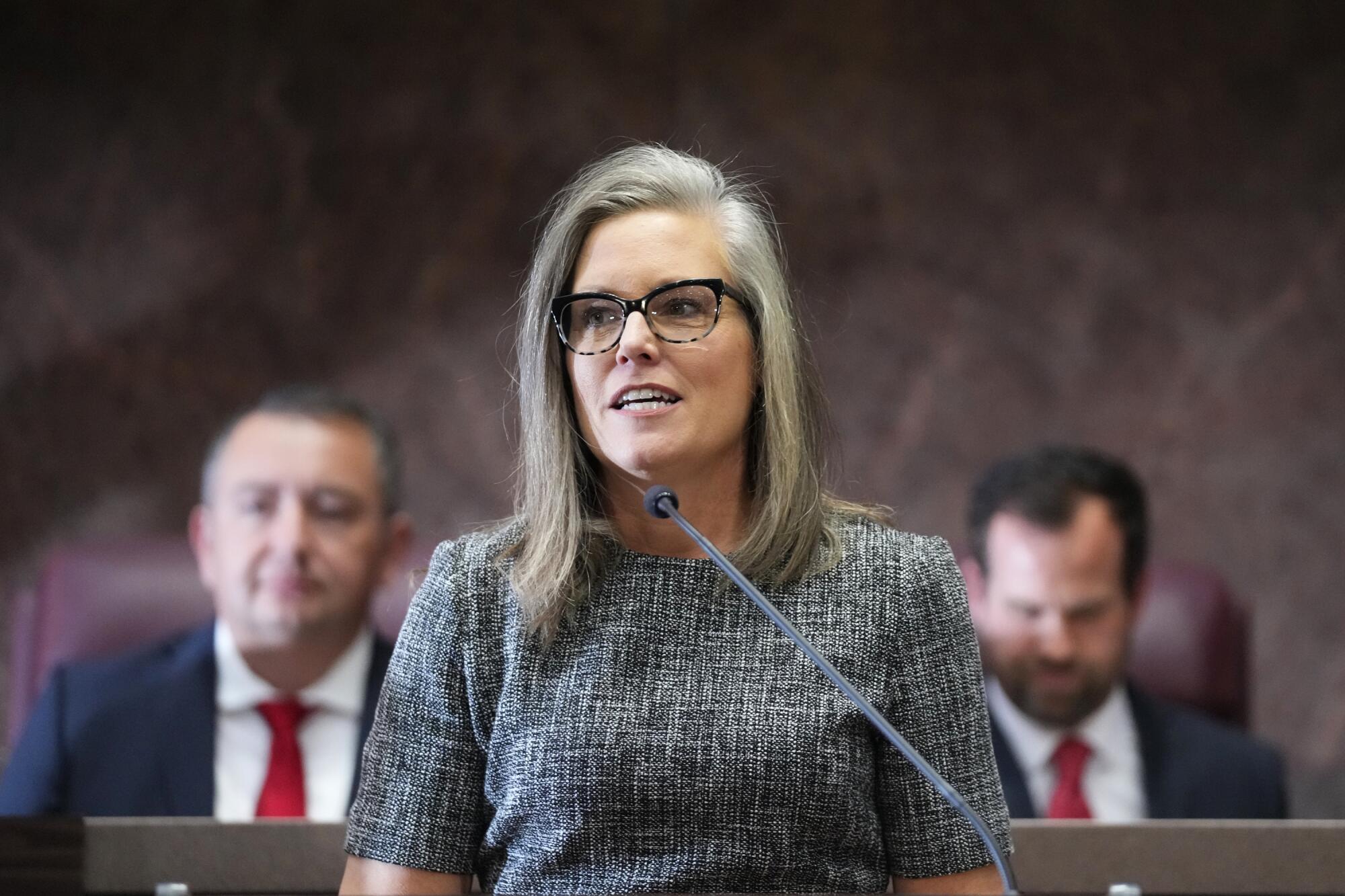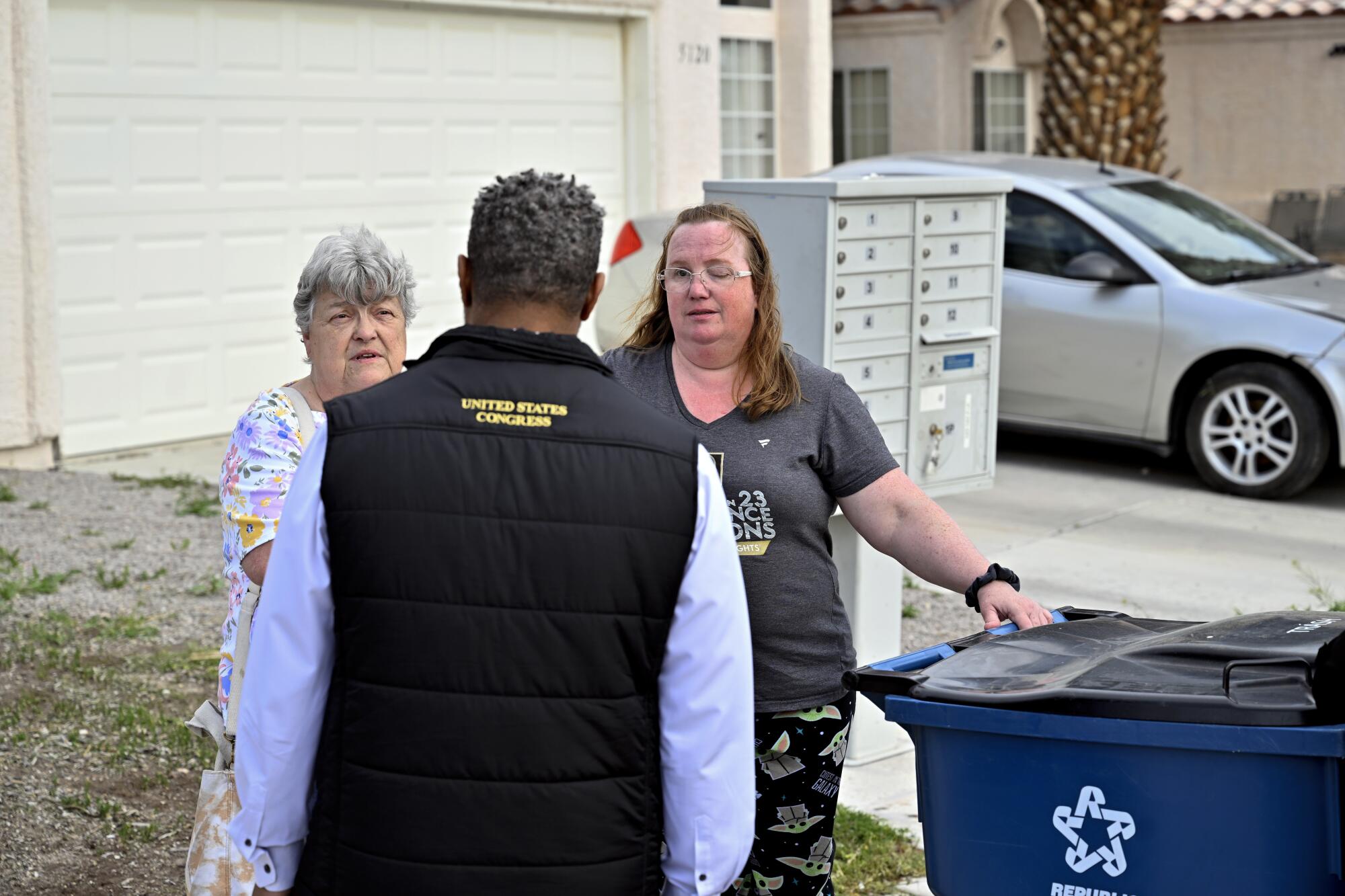California’s housing crisis is hitting Nevada. Could it help Trump?

Christine Dyken had just returned home after picking up her grandson from school, and she was stressed.
Dyken — who lives in a quiet corner of North Las Vegas with her daughter, Doreen, and 7-year-old Christopher — needed to move, and the process was overwhelming and expensive.
Doreen was getting divorced, and they’d been looking for a home they could move into quickly — but one that wouldn’t break the bank. The 74-year-old Dyken had moved in with her daughter to help care for Christopher but also because she couldn’t afford rising rents on her own.
Dyken’s income from disability payments, Social Security, her late husband’s pension and tax-preparation work doesn’t go far in a region where housing costs have soared in recent years, echoing conditions in California.
Newsletter
Get our L.A. Times Politics newsletter
The latest news, analysis and insights from our politics team.
You may occasionally receive promotional content from the Los Angeles Times.
“We’re really living paycheck to paycheck,” Dyken said last month, standing alongside Doreen, who works at a casino.
Home sale prices in Clark County have jumped by 50% since 2016, to about $414,000, according to an average of the middle-third of values collected by Zillow. The news for renters is no better. Zillow computed the expected price of a lease on a single-family residence, and it has jumped almost 70% during the same period, to about $1,750 a month.
As President Biden and Donald Trump prepare to face off once again in November, the hope of owning a home is all but dead — or at least on life support — for many middle-class voters in Nevada and Arizona, battleground states. The culprits are low supply, high interest rates and population growth — driven significantly by new arrivals from California.
Biden’s focus on the subject during a campaign swing last month is a reflection of how profound the crisis is for voters, observers say.
“I think he realizes the magnitude of the situation,” Steve Sisolak, a Democrat who was Nevada’s governor from 2019 to 2023, said of Biden. “He’s not out there to chase polls, but when you do poll people, affordability of housing is a major issue. If you’re not in the housing market right now, it’s going to be difficult to ever get into the housing market.”

Former Nevada Gov. Steve Sisolak, center, at a newly opened Democratic campaign office in Las Vegas.
(David Becker / For The Times)
Dyken said she plans “to hold her nose and vote for Biden,” in part because then-President Trump’s behavior during the Jan. 6, 2021, assault on the U.S. Capitol was so “insulting.” But Doreen, who asked that her last name not be used, said she probably won’t vote. There’s too much going on in her life, and voting never felt like much use, she said.
In the northern Nevada town of Fallon, loan officer Shannon Faught said she’s “leaning toward voting for Trump.” Low interest rates when he was president, at the outset of the pandemic, allowed her to buy several homes, which she uses as rental properties.
Politics don’t weigh on her heavily, she said, but she’d like to see the country be run more like a business and thinks Republicans are better positioned to do that.
“I don’t think about the election a ton except for the fact that it’s maybe having an effect on interest rates,” she said, though she recognizes that those rates are set by the Federal Reserve, which is independent from the administration in Washington. “I think about interest rates. Who knows if they’re being timed with the election?”
The Fed funds rate — a benchmark set by the Federal Reserve — is about 5.3%, a 22-year high. Inflation has dropped to about 2.5% from 7%.
In Arizona, which Biden won by just 10,000 votes in 2020, home prices and rents have skyrocketed as well, as the unemployment rate remains lower than the national average, at 3.7%.
The jump in prices, driven partially by an influx of Californians, has boosted anxiety.
A study from the Common Sense Institute Arizona found a housing shortfall of approximately 67,000 units as of early 2024.
Daniel Scarpinato, who was chief of staff to former Republican Gov. Doug Ducey, said he thinks the border will be the dominant issue among Arizona voters, but issues of affordability and the direction of the economy won’t be far behind. Arizona’s 11 electoral votes and Nevada’s six will be pivotal in a contest in which relatively few states are up for grabs.

Arizona Gov. Katie Hobbs, a Democrat, vetoed a bill that would have removed local control over some planning and zoning regulations.
(Ross D. Franklin / Associated Press)
A debate has roiled Arizona over proposed reforms to zoning laws. Democratic Gov. Katie Hobbs recently vetoed bipartisan legislation intended to boost housing that would have removed local control over some planning and zoning regulations.
A recent poll found that 53% of a representative sample of roughly 3,000 U.S. homeowners and renters said housing affordability would affect how they vote in 2024. The same survey, funded by Redfin, found that about 65% of respondents said housing affordability made them feel negative about the economy overall.
“There’s a general sense that this was once an affordable place to live,” Scarpinato said, pointing to increases in rent and homelessness as byproducts of the malaise.
“The growth for the state from an economic standpoint has been off the charts and fabulous. If you owned a home, your value has probably tripled or quadrupled,” Scarpinato said. “But if you want to move and upsize because of a growing family or something, I think that there are some real stresses on people and just generally a sense that the quality of life is changing.”
In the run-up to his Arizona and Nevada visit last month, Biden called for a $10,000 tax credit for first-time home buyers and for funding to build or renovate more than 2 million homes. He called for the creation of a $20-billion competitive grant fund to accelerate housing creation. His administration is also looking for ways to incentivizelocal municipalities to do away with stringent zoning restrictions.
These proposals would require Congress to enact legislation, unlikely in an election year.
In 2021 and 2022, about 140,000 Californians moved to Arizona. In the same period, about 110,000 Californians moved to Nevada, according to figures released by the U.S. Census Bureau. This influx is part of the reason prices for housing went up in these states, said Daryl Fairweather, Redfin’s chief economist.
There are large parts of the country, she said, where residents are doling out more than 30% of their income on rent. Fairweather and other economists say spending more than that on rent and utilities makes residents “cost burdened.” In 2022, 22 million Americans met this standard.
She said Biden’s ideas are encouraging, but building new homes is the only answer to the crisis.

Rep. Steven Horsford (D-Nev.) in a North Las Vegas neighborhood in his home district.
(David Becker / For The Times)
“That’s the only thing that’s really going to matter 10 years from now. I think everything else is too small to really make a difference in a product that’s so large,” Fairweather said. “Despite there being such a strong economy, when you look at [gross domestic product] or unemployment, people still feel like the economy isn’t good for them because of how high housing costs have gotten.”
Trump, whose campaign didn’t respond to requests for comment, offered few specifics about how he’d bring down home prices. He has mused about getting rid of the Fair Housing Act, which protects minorities from discrimination in the purchase or renting of housing. His campaign characterizes these regulations as waging a “full-scale war on the suburbs.”
Biden, meanwhile, has been “working to lower housing costs, help first-time home buyers achieve their dream of owning a home and lower rents, while Donald Trump spent his time in office gutting affordable housing programs and letting Wall Street firms jack up housing costs on hardworking families,” said the president’s senior campaign spokesperson, Sarafina Chitika.
Rep. Steven Horsford (D-Nev.), who chairs the Congressional Black Caucus, said it was a relief that Biden spoke so directly about the housing crisis when he visited Nevada. The anger over rising prices has made his own reelection contest more competitive, Horsford said, and has become the animating issue in conversations with constituents.
“The person who’s feeling the stress and the anxiety isn’t at fault. It is incumbent upon those of us who are in office to explain our position and what we’re doing to make it better,” he said in an interview at the Culinary Academy of Las Vegas, which he once ran. “I encouraged the White House to center the issue of housing and lowering the cost of housing — not to just talk about inflation as this broad general term. That’s not how average Americans talk about it.”
He described how in his Clark County district, large corporations have swept in, buying up hundreds of rental homes at a time. Many of the companies are based out of state, he said, and have turned around and quickly raised prices, done little to invest in upkeep and evicted residents at higher rates.
He has introduced legislation to empower the federal government to better track home purchases and look for market manipulation among institutional investors.

Christine Dyken, left, and daughter Doreen speak with Rep. Horsford.
(David Becker / For The Times)
In the Culinary Academy’s dining room, Horsford chatted with Ameeluz Cauton, who works at the Bellagio hotel, about the strain of finding stable housing.
Cauton, 35, has worked at hotels and casinos for more than 15 years and at one point owned a home with a boyfriend. They broke up, and she struggled to find a roommate. Then the house next door became occupied with “sketchy people,” she said. For a while, she felt “trapped,” because selling the home wouldn’t give her enough to rent or buy something new, since prices had jumped so significantly.
Eventually, she resolved to just sell and move in with her sister, a temporary solution that’s working fine, she said. Her union, the politically powerful and Democratic-aligned Unite Here Culinary Workers UnionLocal 226, has a down-payment assistance program for first-time home buyers or those who haven’t owned in three years.
Many of her colleagues have felt a similar crunch, and it will certainly be on their minds this election season, Cauton said.
“They’re gonna vote for whoever is going to help them keep their jobs stable,” she said. “I don’t think they’re going to stick with a specific party. It’s just whoever is in line of what we need and what’s going to help us for our future. They could interpret both parties in a different way. But it’s whoever is for the workers.”
link








